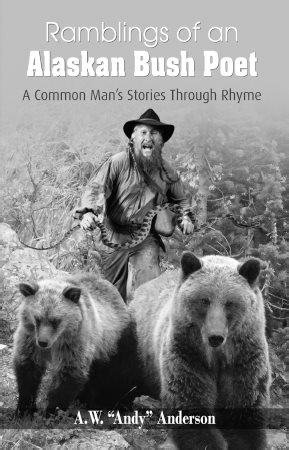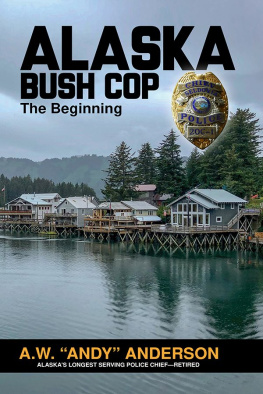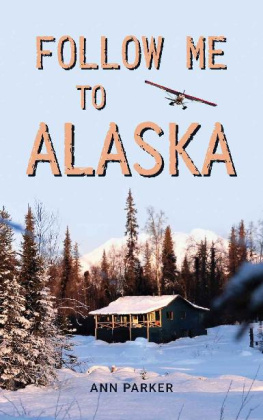Andy Anderson - Alaska Bush Cop: The Beginning
Here you can read online Andy Anderson - Alaska Bush Cop: The Beginning full text of the book (entire story) in english for free. Download pdf and epub, get meaning, cover and reviews about this ebook. year: 2019, publisher: Publication Consultants, genre: Detective and thriller. Description of the work, (preface) as well as reviews are available. Best literature library LitArk.com created for fans of good reading and offers a wide selection of genres:
Romance novel
Science fiction
Adventure
Detective
Science
History
Home and family
Prose
Art
Politics
Computer
Non-fiction
Religion
Business
Children
Humor
Choose a favorite category and find really read worthwhile books. Enjoy immersion in the world of imagination, feel the emotions of the characters or learn something new for yourself, make an fascinating discovery.
- Book:Alaska Bush Cop: The Beginning
- Author:
- Publisher:Publication Consultants
- Genre:
- Year:2019
- Rating:4 / 5
- Favourites:Add to favourites
- Your mark:
- 80
- 1
- 2
- 3
- 4
- 5
Alaska Bush Cop: The Beginning: summary, description and annotation
We offer to read an annotation, description, summary or preface (depends on what the author of the book "Alaska Bush Cop: The Beginning" wrote himself). If you haven't found the necessary information about the book — write in the comments, we will try to find it.
Alaska Bush Cop: The Beginning — read online for free the complete book (whole text) full work
Below is the text of the book, divided by pages. System saving the place of the last page read, allows you to conveniently read the book "Alaska Bush Cop: The Beginning" online for free, without having to search again every time where you left off. Put a bookmark, and you can go to the page where you finished reading at any time.
Font size:
Interval:
Bookmark:
ACKNOWLEDGMENT
I publicly thank Kevin Vandegriff
for all his encouragement in the writing of this book
and for all the hours he spent in its editing. His
expertise is greatly appreciated.

I ve held a myriad of jobs in the more than 53 years Ive made Alaska, the Great Land, my home. Varieties of employment, along with my other life experiences, have given me an interesting and exciting existence. My experiences have been educational, some frightening, some life threatening, some humorous, some heartbreaking, but all played a part in preparing me for the writing of Ramblings of an Alaskan Bush Poet. Im hopeful my backstories will put the reader in somewhat the same mind set, or emotion, I was experiencing at the time. When readers discuss my work I hope to be viewed as a common man who tells his stories through rhyme and, at the same time, someone who paints a vivid picture of what my limericks convey.

A t 16 years of age I quit school and moved to Alaska. I was a kid in a mans world and for the next 15 years I took on a myriad of jobs to survive. I had some harrowing experiences and I lived a very exciting life during that time period. Being born on a farm, I was introduced to the operation of equipment at a very young age and I found myself working in jobs that involved machinery and its operation. In 1979 I became a Police Officer and my career lasted nearly 32 years. The seven short stories in Before The Badge outline many of my lifes experiences between 1964 and 1979. It tells of a young mans life as he is becoming a man and, when doing so, gets involved in many things which are educational, exciting and at times, life threatening. The seven stories are all true.
INTRODUCTION
I n writing Alaska Bush Cop, it is my intention to convey the activities and operations of a small one to two-man Police Department in a small Alaskan bush community. The incidents, investigations, and activities outlined in this book all took place during my nearly 32-year police career as the chief of police for the city of Seldovia, Alaska. When I was hired for the position, I had no police training or any past experience in law enforcement of any kind. To say I was underqualified at the time, to hold any position in law enforcement, let alone that of a chief of police, would be a gross understatement. I was hired to police Seldovia on a temporary basis for a six-week period, or until the city manager could find someone interested in filling the position on a permanent basis. Gary Gunkel, who had held the position for the previous five years, had quit in the spring of that year. Leonard Lusk, a local school teacher, had filled in for the summer, but returned to his duties at Susan B. English School in the fall.
Since Seldovia is a small area, and everyone is acquainted, if not related, I have decided to give most of the people mentioned in this book fictitious names, if names are required at all. I will, however, use names of close friends and those I worked with, unless they have asked me to withhold their names. The cases, the investigations, and the activities I write about, are based on factual events. I will be referencing my daily logbooks and other materials that I generated during the course of my career. In researching my daily logbooks, I discovered I was very lax in the records keeping department for the first few years but, after going to the Alaska State Trooper Academy in Sitka Alaska, I became much more proficient in this area. For that first two to three years, I will be depending more on memory than on actual notes or reports. I have included many of the investigations and activities that I hope you will find interesting or entertaining.
It is possible that some local residents who read my description of an event will be able to identify some of the unnamed or fictionally named people due to the circumstances surrounding the specific case. This book is not intended to offend anyone, only to report the actual occurrences in the manner in which they occurred during my tenure as chief of police for the city of Seldovia, Alaska. Im sure the reader will find the number and types of responses that actually took place in such a small community surprising. It is my hope that my descriptions of the events will be enlightening and informative, as well as entertaining.
THE CITY OF SELDOVIA
T o understand my duties as a police chief, its important you understand a little about the logistics of the place where I served. Seldovia is a small first-class Alaska City located on the Southern Kenai Peninsula, approximately 14 miles south of Homer, on the east side of Kachemak Bay. Were located approximately 160 miles, as the crow flies, south of Anchorage. Seldovia is accessible only by air or water, and no roads connect us with the Alaska road system.
In 1979, Seldovia had approximately 800 residents, and there were three bars, two liquor stores, two grocery stores, and a fish processing plant. The two stores handled food supplies as well as mercantile items. We had, and still have, one fuel company, who keeps us supplied with necessary petroleum products as well as some hardware items. Logging, commercial fishing, and the fish processing plant were the major industries in the area at the time, and Seldovia was a very active and busy community.
The 330-foot-long Alaska State Ferry, Tustumena, serves our area, bringing in passengers, vehicles, and most of our freight and building materials, and is an extension of the Alaska Road System. It has been serving our community since 1964 and still continues today, some 55 years later.
Prior to the 1964 earthquake, Seldovia had been a very busy port with four onshore canneries, and, occasionally, a floating processor or two, where king crab, salmon, and shrimp were all processed. Due to the 1964 earthquake, the landmass in and around Seldovia sunk four to six feet, depending on who you talk to. With Seldovia being a boardwalk town built on the waterfront, the larger high tides would cover the boardwalk and enter the homes and buildings located on the Main Street, flooding the entire waterfront. Due to the health hazards, which were of great concern, the boardwalk was removed, and all the canneries and structures on Main Street were torn down. Following the demolition of the waterfront properties, only one cannery rebuilt its operation. They bought and processed fish products. The loss of three of the four canneries caused the population of Seldovia to decrease considerably. Many families, who depended on fishing for a living, moved to other ports. In August of 1979, when I was sworn into office, the city was still very active and certainly in need of a police presence. It was during this time that I began my career as a police chief for the city of Seldovia.
THE MAN THEY CALLED CHIEF
I never planned a career in law enforcement and never really aspired to be a police officer. I didnt even have a high school diploma when I took the position. During my teenage years, I couldnt see the benefit of higher education, so I quit school and went to work, wanting to get into the workplace and earn some money. On more than one occasion over the years, I have felt that a high school education would certainly have made life a lot easier. After taking the chiefs position, I went back to school, studied and obtained my GED.
I had also been in a farming accident when I was seven years old, which left me with sight in only one eye, a condition that would normally keep a person from even being considered in a career in law enforcement. I have also fought a weight problem most of my life, and that too is something that is not conducive to becoming a police officer. So, you ask, how did an under-educated, one-eyed, overweight 33-year-old man become a police officer and continue in that occupation for nearly thirty-two years, setting a record for the longest-serving police chief for any city in Alaska history?
Next pageFont size:
Interval:
Bookmark:
Similar books «Alaska Bush Cop: The Beginning»
Look at similar books to Alaska Bush Cop: The Beginning. We have selected literature similar in name and meaning in the hope of providing readers with more options to find new, interesting, not yet read works.
Discussion, reviews of the book Alaska Bush Cop: The Beginning and just readers' own opinions. Leave your comments, write what you think about the work, its meaning or the main characters. Specify what exactly you liked and what you didn't like, and why you think so.









